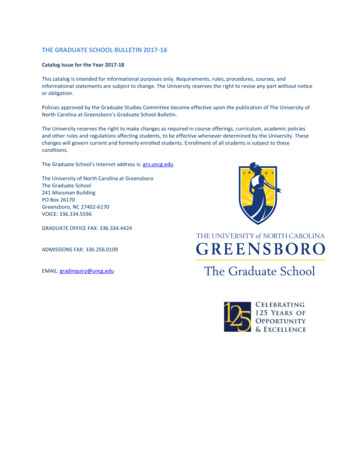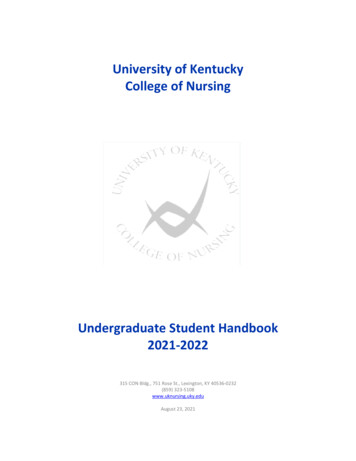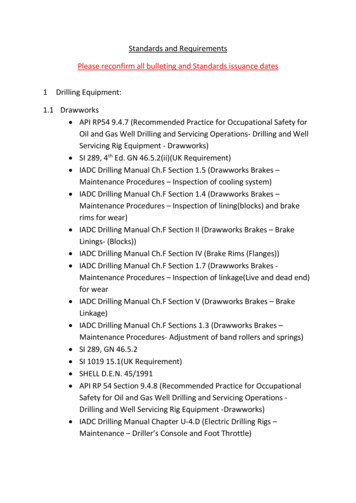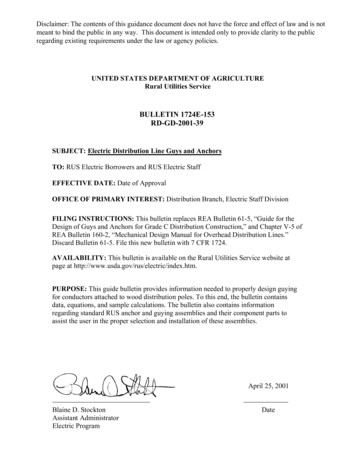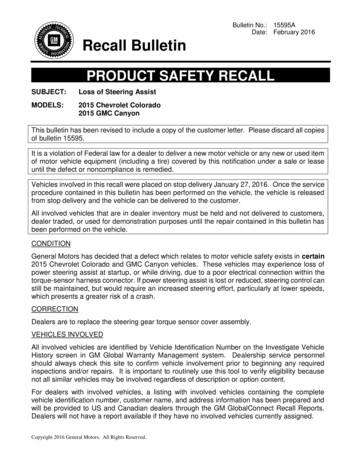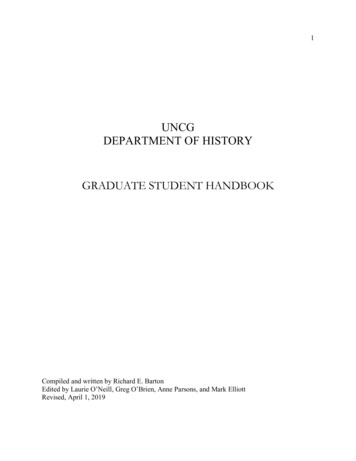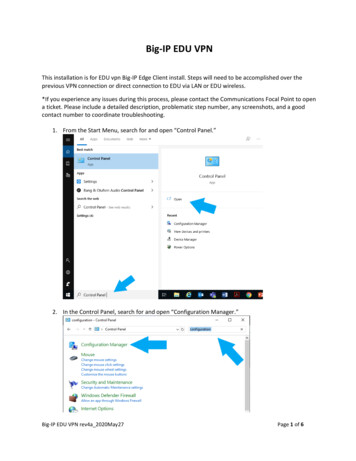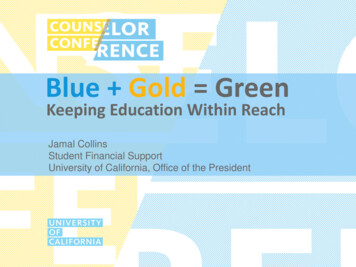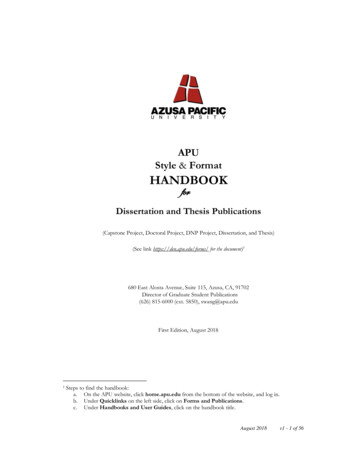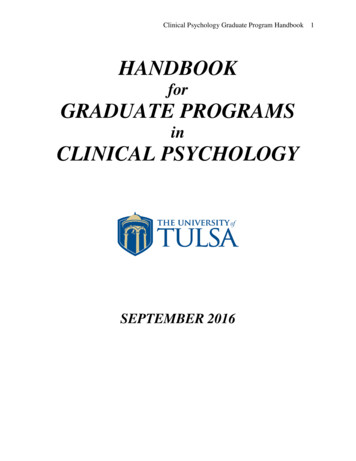
Transcription
Clinical Psychology Graduate Program HandbookHANDBOOKforGRADUATE PROGRAMSinCLINICAL PSYCHOLOGYSEPTEMBER 20161
Clinical Psychology Graduate Program Handbook2Handbook ContentsContents1.0 Introduction and Overview . 32.0 Application of This Handbook. 53.0. Program Structure and Governance . 64.0. Equal Opportunity Policy . 75.0. Disclosure . 76.0. Program Admission . 87.0. Graduation Requirements . 98.0. Criteria for Satisfactory Progress . 139.0. Transfer of Credit, Waiving of Requirements, and Applying Credits . 1710.0. Changing to Clinical from I/O . 1911.0. Advisors and Doctoral Committees . 1912.0. Pre-candidacy Project (Ph.D. ONLY) . 2113.0. Comprehensive Examination (Ph.D. ONLY) . 2314.0. Dissertation (Ph.D. ONLY) . 2615.0. Practicum and Field Work . 2816.0. Internships (Ph.D. ONLY) . 3017.0. Financial Assistance. 3318.0. Masters Degrees for Students in the Ph.D. Program . 3619.0. Responsibilities, Privileges, Grievances . 36Forms Appendix. 39Curriculum Appendix . 56Scheduling Appendix . 80
Clinical Psychology Graduate Program Handbook31.0 Introduction and Overview1.1. The faculty welcomes you. By admitting you to the program, we have already recognizedyour outstanding achievement as a student of psychology. We will work hard to facilitateexcellence in your development as a scientist-practitioner of psychology. Graduate school canbe a great time of life: a highly able peer group, the opportunity to concentrate heavily on a topicof intellectual interest, a time of rapidly advancing skills. There can also be great challenges:new levels of performance expectations, interpersonal stresses associated with clinical work anddemanding schedules, and the financial pressures of student life. The faculty, having lived thislife, appreciate both the opportunities and challenges you face. We look forward to helping youdevelop to your fullest potential as a scientist-practitioner of psychology.1.2. The mission of graduate training in clinical psychology is to provide quality doctoraltraining in the scientist-practitioner model within a small private university setting. Science andpractice are regarded as inseparable elements. Practice itself is regarded as the application of thetheories, methods, and results of scientific psychology to clinical problems. The science ofpsychology is construed broadly, and students are expected to develop familiarity with a widerange of psychological theories, methods, and results. We encourage students to understand thelimits of human perception, reason, and intuition, and to appreciate scientific methods ascorrectives to the flaws and biases of natural human judgment.1.3. The goal of the program is to train professionally competent clinical psychologists with abroad background in the field of psychology who can apply psychological theory, assessment,research methodology, and clinical skill to complex clinical problems. To elaborate this goal,our program has five broad training objectives: (1) provide a generalist model of training in thediscipline of psychology; (2) develop fundamental clinical skills based on scientific research; (3)develop fundamental skills for psychological research; (4) promote high academic, ethical, andprofessional standards in all aspects of professional development and practice; and (5) preparestudents to adapt their methods and practice to meet the needs of diverse populations.To fulfill these objectives, the program has seventeen competencies. The competencies are listedbelow and are denoted by the Aim they are intended to objectify:1.1 Students will demonstrate an understanding and knowledge of: biological bases ofbehavior; human development and psychological, social, and biological changes acrossthe lifespan; theories and principles of social psychology; cognitive psychology; humanemotions; and history of psychology as a science and its major systems and theories.2.1 Students will demonstrate an understanding and knowledge of the scientific basis forpsychological intervention.2.2 Students will demonstrate knowledge of empirically-supported treatments, and willbe able to articulate the components of a treatment plan.2.3 Students will demonstrate ability to differentially diagnose major mental disorders.2.4 Students will be able to articulate major etiological theories of mental disorders andapply these theories to clinical cases.2.5 Students will be able to conduct an intake interview and Mental Status Examinationand report the results.
Clinical Psychology Graduate Program Handbook42.6 Students will demonstrate knowledge and understanding of empirically-supportedtreatment, and will be able to articulate the components of a treatment plan.2.7 Students will demonstrate knowledge and understanding of theories and methods ofpsychological measurement.2.8 Students will demonstrate ability to administer, score, interpret and write reports ofintellectual assessments including the WAIS-IV.2.9 Students will demonstrate ability to administer, score, interpret, and write reports ofobjective personality assessments including the MMPI-2.3.1 Students will demonstrate knowledge of scientific methods of collection and analysisof psychological data.3.2 Students will demonstrate knowledge and understanding of theories and methods ofpsychological measurement.4.1 Students will demonstrate knowledge of APA Ethical Principles of Psychologists andCode of Conduct, ASPPB Code of Conduct, and major legal principles guiding practice.Students will display an ability to analyze clinical problems from ethical and legalperspectives.4.2 Students will demonstrate competence involving communication and interpersonalskills.4.3 Students will demonstrate fundamental knowledge of consultation, supervision, andinterdisciplinary practices.4.4 Students will meet minimal standards of professional values, attitudes, and behavior.5.1 Students will demonstrate knowledge of nature and impact of human diversity onclinical assessment and intervention.The relationship between program Objectives and program Competencies appears in Table 1 inthe Curriculum Appendix of this Handbook.1.4. In the graduate programs in clinical psychology, educational practices are based upon anappreciation of the distinction between declarative and procedural knowledge. Both are regardedas essential. Thus, in addition to acquiring broad declarative knowledge of psychologicaltheories, methods, and results, students are given course work and practicum experiences todevelop procedural skills. Those procedures involve the application of the scientific fruits ofpsychological research to clinical problems. To further refine ability to demonstrate proceduralknowledge, the doctoral program requires students to complete an internship.1.5. The graduate programs promote ethical and legal practice. Both declarative and proceduralknowledge of the codes, guidelines, standards, and laws guiding practice are developed. In allpsychological activities, students are expected to be aware of and remain in compliance withrelevant ethical and legal guides to practice. Illegal or unethical practice or academicdishonesty are unacceptable and may be cause for termination. The forms appendix to thisHandbook contains a Statement on Familiarity with Critical Information and Conformity withLaw & Standards of Ethics and Conduct. All graduate students in clinical psychology areexpected to finish the required reading and turn in the signed form within two weeks of startinggraduate school.
Clinical Psychology Graduate Program Handbook51.6. The faculty of the Clinical Program and of the psychology department care deeply aboutgraduate education and the development of our students. It is the responsibility of every facultymember to treat all students with respect and dignity. Both students and faculty should attemptto cultivate a collegial atmosphere of mutual respect, of respect for individual differences, ofrespect for intellectual freedom and freedom of expression. Discrimination, sexual harassment,and disrespectful behavior are unacceptable in our programs.1.7. The purpose of the faculty is to educate the students and promote their development: therole of the faculty is not one of therapist. Student communication to faculty is not protected bypsychotherapist-patient privilege and the expectation is that faculty will communicateinformation among the persons responsible for the student’s training as needed to promotetheir training. This may include communication with practicum supervisors, communicationwith the Clinical Program Committee, and communication with other faculty memberstraining the student. The Family Educational Rights and Privacy Act (FERPA) of 1974 protectsstudent privacy. Other than official practicum supervisors who function as part of the practicumfaculty, communication to parties outside the university is limited by this act.1.8. Our programs attract talented students, and the faculty expect and cultivate excellence. Theprogram faculty, in addition to caring about the development of our students, also care about thequality of our profession and the potential patients of our students. Thus, all programexaminations should be rigorous, fair, and judged to a high quality standard. No programexaminations are simply pro forma.1.9. The graduate programs in clinical psychology intend to cultivate a life-long desire toacquire new professional knowledge, new skills in applying that knowledge, and continueddevelopment in the ethical and legal dimensions of practice. The clinical training programspromote the alterative view: “No psychologist or masters-level practitioner should EVER be‘finished’ with learning and professional development.” Our degree programs establish a strongfoundation for individuals to continuously grow and develop as professional psychologists overthe course of their careers.1.10. Completion of our degree programs does not in and of itself qualify a person to providepsychological services. The practice of psychology is regulated by state governments, andsignificant additional supervised experience is often required after completing degreerequirements. Students are strongly encouraged to seek details concerning licensurerequirements. In doing so, they can seek appropriate educational experiences available in theprogram. However, because of diverse requirements across jurisdictions, some curricularrequirements may be unavailable within our programs.2.0 Application of This Handbook2.1. This Handbook specifies the policies and procedures for students entering graduateprograms in Clinical Psychology at The University of Tulsa. It applies to students who enteredthe program on the date specified on the title page of this handbook. Students who entered underan earlier edition of the Handbook may elect to adopt the current Handbook. A form is availablein the Appendix for students to do so. The request must be submitted to the Director of Clinical
Clinical Psychology Graduate Program Handbook6Training. After adopting a more recent Handbook, students may not revert to an earlierHandbook.2.2. Program requirements, policies, and procedures presented within this Handbook areintended to supplement and remain consistent with those of The University of Tulsa, TheGraduate School of The University of Tulsa, and the Department of Psychology. Policies andprocedures of these organizations appear in the Graduate Bulletin of The University of Tulsa, theUniversity of Tulsa Student Handbook, and the faculty manual for the University of Tulsa. Asspecified in the Graduate Bulletin, the department is permitted to establish additionalrequirements beyond those established by the graduate school. In the event of conflict, theprocedures, policies, and procedures of the University and Graduate School supersede thosespecified here.2.3. Students should be familiar with this Handbook, the Graduate Bulletin of The University ofTulsa, and the University of Tulsa Student Handbook. Students should note that material coveredas an overview in one section of this handbook may be elaborated in another section. Studentsare responsible for knowing the requirements, rules and procedures of their programs. Withintwo weeks of starting classes in a graduate Clinical Program, students should fill out the form(contained in the Forms Appendix) documenting that they have read this handbook, thePracticum Manual, The Oklahoma Psychologists Licensing Act, the APA's "Ethical Principles ofPsychologists and Code of Conduct", and the "Code of Conduct" of the Association of State andProvincial Psychology Boards. Copies of these documents are available from the ClinicalProgram Secretary. Signing that statement signifies an intention to act in conformity with thelaw and standards of ethics and conduct. Students unwilling to signify such an intention shouldwithdraw from the programs.3.0. Program Structure and Governance3.1. The graduate Clinical Training Programs are housed within the Department of Psychology,an element of the Henry Kendall College of Arts and Sciences at the University of Tulsa. Asnoted in the Graduate Bulletin, all graduate education within the University of Tulsa issupervised by The Graduate School of the University of Tulsa.3.2. The Chair of the Psychology department serves at the pleasure of the Psychology Facultyand the Dean of The College of Arts and Sciences. The Chair of Psychology appoints a Directorof Clinical Training (DCT), generally from among the core clinical psychology faculty. Coreclinical faculty are graduates of accredited clinical training programs and accredited internships.If a qualified Acting Director of Clinical Training is chosen from outside the core clinicalfaculty, the Chair shall appoint an Associate Director of Clinical Training from the core clinicalfaculty. The Chair of Psychology also appoints a governing committee, called the ClinicalProgram Committee, composed of all core clinical faculty and the DCT or Acting Director. TheDCT or Acting DCT serve as chair of the Clinical Program Committee.3.3. The Clinical Program Committee, subject to approval of the Graduate Council of theGraduate School, establishes program procedures, rules, and curriculum to accomplish the
Clinical Psychology Graduate Program Handbook7mission of excellence in the training of scientist practitioners, consistent with the mission of TheUniversity of Tulsa.3.4. The Clinical Program Committee must approve any requests for waiver or exception to therules, procedures, and curriculum requirements contained in this Handbook. A copy of theGeneral Petition Form used to request approval in contained in the Forms Appendix to thisHandbook.3.5. Although appeals procedures will be detailed later in this Handbook, students may apply forwaivers or appeal decisions in writing to the Clinical Program Committee. If the student isdissatisfied with the response, the student may appeal to the Dean of Graduate Studies. Afterthis line of appeal has been exhausted, the University Grievance Committee may hear the matter,as detailed in The University of Tulsa Student Handbook.4.0. Equal Opportunity Policy4.1. The Equal Opportunity Policy of the University is printed in the Graduate Bulletin, andportions of it are excerpted here:The University of Tulsa is an equal opportunity employer and institution of higherlearning. The university endeavors to create and nurture an informed and inclusiveenvironment in its work place and education programs. Affirmative action and equalemployment opportunity are integral parts of The University of Tulsa, not just becausethey are legally mandated but because we recognize that the present and future strengthof the university is based primarily on people and their skills, experience and potential.The University of Tulsa does not discriminate on the basis of personal status or groupcharacteristics, including, but not limited to, the classes protected under federal and statelaw. The University of Tulsa seeks to recruit, select, and promote students, faculty, andall other employees on the basis of individual merit.5.0. Disclosure5.1. Consistent with Standards 7.04 and 7.05 of the APA Code of Ethics, the clinical psychologytraining program balances the autonomy and privacy of its students with the need for theprogram to ensure competency. While enrolled in the clinical psychology program, students areencouraged to develop insight into their personal experiences that may affect their futureperformance as clinicians. This may occur in written assignments or classroom discussions. Nostudent will be required to disclose details of their lives (e.g., history in personal relationships,prior abuse or neglect, sexual history, or treatment experience), but they may do so voluntarily.5.2. Nonetheless, if the program determines that a student’s personal problems pose a risk to thesafety of others or impairs their ability to perform with professional competence, the student maybe required to obtain individual or group therapy from a licensed psychologist who is unaffiliatedwith the program. The student will be permitted to choose his or her own therapist. Ifcircumstances warrant, the therapist may be asked to provide formal confirmation that thestudent is capable of safely meeting the Program’s educational and clinical responsibilities.
Clinical Psychology Graduate Program Handbook8Upon establishing a therapeutic relationship, students should ensure that the therapist is willingto make such a determination. Students or prospective applicants who have questions aboutthese requirements are encouraged to contact the Director of Clinical Training.6.0. Program Admission6.1. The number of openings in our graduate programs is small compared to the number ofapplicants. Historically, we have only been able to accept high quality applicants whose interestsand needs fit our program. Minimum requirements are specified to define the potential range ofthe student body in our programs. However, it would be unusual for a person with minimumqualifications to be admitted. Students in our programs typically exceed the minimal standards.Obviously, many individuals with excellent qualifications cannot be admitted because of thelimited number of openings.6.2. Admission Committee, Coordinator, and Graduate Dean. The Clinical Program Committeeserves as an admissions committee, and includes an Admissions Coordinator who is designatedby the DCT. The admissions committee makes recommendations to the Graduate Deanregarding admission, conditions, probation status, and waiving of requirements. The GraduateDean makes graduate admission decisions.6.3. Minimum Requirements for Admission with Full Standing. A student may berecommended for admission in full standing if, in the judgment of the committee, the student hasdemonstrated strong qualifications in all areas. To apply for admission, applicants must possess:1. A Bachelor’s degree from an institution accredited by a recognized regional accreditingbody.2. An undergraduate grade point average of at least 3.0 (on a 4.0 scale).3. Graduate Record Examination. No minimum score is specified, but we scrutinize thesescores closely.4. Eighteen hours of credit in psychology courses or in courses that are primarilypsychological in nature or in a closely related field. Applicants must have taken:a) Abnormal psychology and a course in statistics, tests and measurements, orexperimental psychology.b) Recommended courses include developmental psychology, learning, socialpsychology, personality, cognitive psychology, physiological psychology, history ofpsychology, and general psychology.5. Three satisfactory letters of recommendation.Notably, students currently enrolled in our Master’s program may apply for admission to theDoctoral program. Such students are encouraged to apply only after they have completed theirfirst year in the Master’s program.6.4. Admission with Conditions.6.4.1. Deficiencies. Under certain circumstances and with the approval of theadmissions committee, a student may be admitted with deficiencies in background
Clinical Psychology Graduate Program Handbook9courses. Such deficiencies must be remediated during the first two years of enrollment inthe program. To remove an admission deficiency, the student may take a coursepertaining to the deficiency, and receive a grade of "C" or better. Alternatively, thestudent may pass a proficiency examination pertaining to the content of the course. Aproficiency examination must be taken from a Psychology faculty member. Prior totaking a proficiency examination, the student must petition the Clinical ProgramCommittee for approval to do so. No faculty member is obligated to offer a proficiencyexamination.6.4.2. Other Conditions. A student who at the time of application is completing prerequisites for admission can, with the approval of the admissions committee, berecommended for conditional admission. To satisfy the conditions of admission, thestudent must successfully complete necessary psychology courses or submit an officialtranscript showing that a Bachelor’s degree has been awarded. Upon satisfying specifiedconditions, students may enroll in the graduate program.6.5. Admission on Probation. Under some circumstances, with the recommendation of theadmissions committee, the Graduate Dean may admit a student on probation. Usual reasons foradmission on probation might include, among others, (a) a grade point average below 3.0, (b) ahighly variable record, (c) references only from non-psychologists. A student admitted onprobation must maintain a 3.0 grade point average for the first 9 credit hours of graduate coursework to remove the probation and to continue in the program, as per the Graduate Schoolguidelines.7.0. Graduation Requirements7.1. Graduate School requirements are given in the Graduate Bulletin, and students shouldthoroughly familiarize themselves with all relevant procedures and regulations contained in theGraduate Bulletin.7.2. Application. Application for a degree and payment of any necessary fees must be made tothe Graduate School at least six weeks prior to graduation.7.3. Residence. The clinical psychology programs are full time programs. With extenuatingcircumstances, a student may enroll part-time in the Doctoral or Master’s Programs, but onlywith the approval of the Clinical Program Committee and the Graduate Dean. Part-time doctoralstudents must complete two consecutive semesters as full-time students prior to graduation tomeet Graduate School residence requirements. Students must be enrolled during any semesterUniversity resources are used and during the semester in which they intend to graduate. Thismay, on occasion, require enrollment in a non-graded residency credit for one hour. Whilestudents are completing their pre-doctoral internship, they will enroll in a zero credit course toretain their status as students in good standing.7.4. Thesis. A Master’s thesis is not required, and a thesis option is unavailable.
Clinical Psychology Graduate Program Handbook107.5. Admission to Candidacy. A student is ineligible for the Ph.D. until formally admitted tocandidacy. Admission to candidacy is granted by the Graduate School, and follows therecommendation of the student’s Doctoral Committee and Director of Clinical Training. Therecommendation by the Director of Clinical Training requires successful completion of the precandidacy project, minimum graduate GPA of 3.0, general good standing in the program, andhaving passed the written and oral Comprehensive Examinations for the Ph.D. Furthermore, asper Graduate School policy, students must have their dissertation proposal accepted andapproved by the respective committee. Additional grade requirements for core and practicaclasses are described under section B, Psychology Department Requirements.7.6. Dissertation Proposal, Dissertation and Oral Examination. A formal dissertation proposaland a completed doctoral dissertation are required of all Ph.D. students. Students are not allowedto enroll for dissertation credits until admitted to candidacy. An oral examination based on thedissertation is required and must be passed before the dissertation is accepted.7.7. Grade Requirements. No grade below a "C" will earn credit toward degree requirements,and an overall grade point average of 3.0 must be maintained for graduation. In addition,students must achieve a “B” or higher in core clinical courses, practica, and courses which serveas criteria for Program competencies.7.8. Probation. A student cannot graduate if on probation. Repeating courses (both the originalgrade and the repeated grade are counted in the average) or taking additional courses to raise thegrade point average to at least 3.0 will fulfill this Graduate School requirement. However,because the overall grade point average for required psychology courses must also be 3.0 orhigher, probation due to poor performance in psychology courses can only be removed byrepeating psychology courses for which the grade received was less than a "B". Until the gradepoint average is raised sufficiently the student cannot graduate.7.9. Completion of Special Requirements. If a student has been asked to do remedial work ormeet special conditions, the body making the request (e.g., doctoral committee, programcommittee, or faculty) must, before the student can graduate, agree that the conditions have beenmet.7.10. Program Specific Requirements7.10.a. M.A. Program7.10.a.1. Courses. Course requirements for the M.A. in Clinical Psychology are listed inthe Curriculum Appendix. At the student's discretion other courses may be taken inaddition to the required courses, but will not count toward the degree. Transfer creditmay be applied toward meeting the course requirements, as described in other sections ofthe handbook.7.10.a.2. Research. Although the Clinical M. A. program does not require or offer athesis, research opportunities and course credit are available. Credit in PSY 799x
Clinical Psychology Graduate Program Handbook11(independent research) may be added to minimum credits required for the degree,depending on the program of study the student develops with the program advisor.7.10.a.3. Grade Requirements. No grade below a "C" will be allowed to apply towardgraduation requirements. In core clinical courses and practica, no grade below a “B” willbe allowed to apply to program requirements. The overall grade point average in requiredpsychology courses, not counting transfer courses, must be 3.0 or greater.7.10.a.4. Time Limitations. Any graduate credits more than six years old will not counttoward requirements for graduation (including transfer courses). If program requirementschange for courses exceeding the time limit, the student becomes responsible for the newrequirements for that portion of the work that has expired. Extensions that allow expiredcourses to count toward the degree may be sought from the Graduate Dean, upon therecommendation of the Clinical Program Committee.7.10.b. Ph.D. Program7.10.b.1. Courses. Course requirements for the Ph.D. in Clinical Psychology are listed inthe Curriculum Appendix. At the student's discretion other courses may be taken inaddition to the required courses, but will not count toward the degree. Transfer creditmay be applied toward meeting the course requirements as detailed in other sections.7.10.b.2. Pre-candidacy Projec
Clinical Psychology Graduate Program Handbook 3 1.0 Introduction and Overview 1.1. The faculty welcomes you. By admitting you to the program, we have already recognized your outstanding achievement as a student of psychology. We will work hard to facilitate excellence in your development as a scientist-practitioner of psychology.
